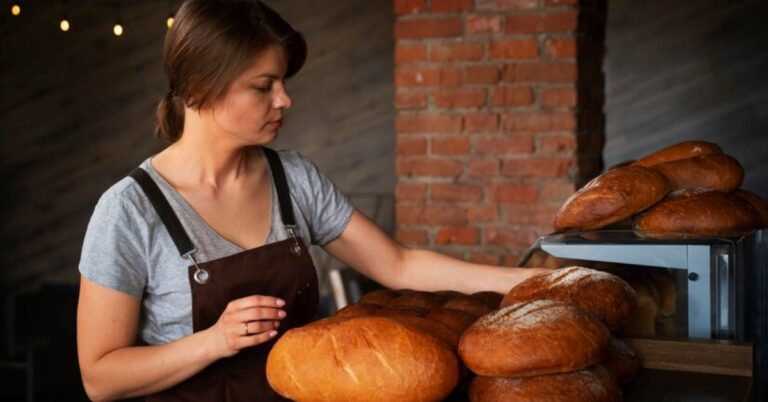Fresh bread is a timeless staple in households due to its versatility, flavor, and comforting aroma. Whether served with soups, made into sandwiches, or enjoyed with spreads, it complements every meal. Freshly baked bread often contains fewer preservatives than packaged options, making it a healthier choice for families. Its softness and natural taste enhance savory and sweet dishes, appealing to all ages. Beyond nutrition, slicing or baking bread often fosters a sense of tradition and connection. Its role in daily meals and special gatherings underscores why fresh bread remains a beloved essential in homes worldwide.
Bread: A Household Essential
Bread, in its many delightful forms, is a culinary cornerstone in households across the globe. Its omnipresence extends from early-morning breakfast tables to late-night comforting snacks. A fresh loaf, like those found among the delights from our French Asian bakery, can elicit nostalgic memories and is a testament to bread’s eternal appeal. Baking bread combines simple ingredients to create something truly magnificent, combining tradition with a deep sense of comfort.
Bread’s versatility enhances almost any meal, whether a light snack or a full-blown dinner. Imagine the satisfying crunch of a toasted slice topped with avocado or a fluffy roll paired with a hearty soup. Bread serves as a medium for tastes, textures, and cultural customs and is a food item. Its presence enhances our dishes, and its significance in a well-balanced diet is undeniable.
Health Benefits of Fresh Bread
Fresh bread complements a balanced diet because it has many health advantages, especially when cooked with healthy components. Dietary fiber, abundant in whole-grain bread, promotes intestinal health, facilitates digestion, and helps keep blood sugar levels stable. Additionally, freshly made bread is more natural and nutrient-rich than boxed bread because it contains fewer preservatives and additives.
Bread made with fortified flour may include essential vitamins and minerals, such as iron, folate, and B vitamins, which can support overall health and vigor. For those looking to control sodium or sugar intake, fresh bread offers the flexibility to choose or bake varieties tailored to specific dietary needs. When consumed in moderation as part of a well-rounded diet, fresh bread can deliver lasting energy, support healthy digestion, and offer a satisfying source of essential nutrients for daily living.
The Variety of Bread Available
Bread’s diversity is one of its greatest strengths. It offers a spectrum of flavors and textures that enrich culinary experiences. Consider the distinctive crunch of a French baguette, ideal for sandwiches or as an accompaniment to cheese platters. Then there’s sourdough, with its chewy, robust character and signature tangy flavor derived from natural fermentation.
Breads made by artisans are becoming more and more popular. They frequently include depth and complexity-enhancing ingredients like olives, herbs, and seeds. Everyone may enjoy this popular cuisine thanks to gluten-free breads, which are made to accommodate people with specific dietary requirements. This variety caters to different cultural tastes and promotes creativity in the kitchen, encouraging home cooks and professional chefs alike to experiment and innovate.
Bread’s Importance in Different Cultures
Across the globe, bread holds more than just nutritional value; it is imbued with cultural significance. For many, bread symbolizes sustenance and togetherness, playing a key role in religious ceremonies and family gatherings. For instance, in Italy, freshly baked focaccia is often a centerpiece at communal meals, while in India, naan accompanies fragrant curries and stews.
This symbolic nature of bread reflects its historic role as a staple food. Traditions surrounding bread-making and consumption are passed down through generations, preserving cultural identity and communal bonds. The sensory experience of making and sharing bread can evoke powerful memories and inspire new traditions, underscoring its integral place in human life.
Homemade vs. Store-Bought Bread
There are apparent variations in quality, nutrition, and flavor between store-bought and handmade bread. Complete control over the ingredients is possible when making bread at home, as commercial bread frequently contains artificial additives, preservatives, and excessive amounts of salt or sugar. This personalization allows the creation of healthier loaves suited to particular dietary requirements, including whole-grain or gluten-free alternatives.
Store-bought bread, while convenient and long-lasting due to preservatives, may lack the fresh taste and texture of homemade versions. Additionally, some commercial loaves include hidden ingredients like high-fructose corn syrup or trans fats, which can be less beneficial for overall health.
Homemade bread stands out for its warmth, aroma, and freshness, creating a comforting experience that store-bought bread often cannot replicate. While baking at home requires time and effort, the reward is a healthier, more personalized product that supports mindful eating and culinary satisfaction.
Tips for Storing Bread
Bread must be stored properly to preserve its texture and freshness; keep it out of direct sunlight and in a superb, dry location. A bread box or a cloth bag is ideal as it allows air circulation while preventing the bread from drying. For long-term storage, slice the bread, wrap it tightly in plastic or foil, and place it in the freezer. If bread is stored in the refrigerator, it will not go faster. When it’s time to dine, toast the frozen bread or thaw it at room temperature for the most flavor and texture.
The Impact of Fresh Bread on Daily Living
Fresh bread is multifaceted, providing nourishment and a social and cultural anchor. Whether incorporated into meals at home or enjoyed at family gatherings, it encourages shared experiences and fosters connection. Baking and serving bread can reinforce family ties and create lasting memories.
Bread’s significance stretches beyond mere sustenance; it informs cultural identities, expresses creativity, and brings people together. Embrace this age-old food and its ability to warm your home. After all, fresh bread is timelessly ingrained in our daily lives, facilitating moments of comfort, joy, and community connection.

